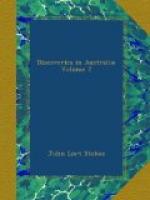ALBANY.
Here, just above a dazzling white sandy beach, a straggling village points out the township of Albany. Mounts Clarence and Melville reared their bare granitic heads on either side, and huge fantastically-shaped boulders were strewn over their slopes. The origin of this settlement may not be generally known: it was first planned, in consequence of a report that the French were about to establish themselves there; which turned out to be the truth, for they had actually formed and abandoned a settlement before Major Lockyer arrived from Sydney, in 1825. The gang of convicts he brought with him was withdrawn, when Albany became part of the government of Western Australia.
Among the few improvements that had taken place since our visit in 1836, were a jetty and a government storehouse. The latter was close to the spot where the observations were made, and where I noticed some trappean dykes intersecting the granite in a North-North-West direction. I observed the same circumstance at Simon’s Bay, Cape of Good Hope.
I was sorry to see that the infant town of Albany had made so little progress, especially as it possesses by far the finest harbour in Western Australia. There is no doubt that ultimately its great natural advantages will be developed; but it is somewhat surprising that they have not already been turned to better account. Though there is not a very great extent of good land in the neighbourhood, there is amply sufficient to hold out encouragement to the settler; especially when we consider that this is one of the most healthy portions of the continent, that it is never visited by hot winds, and that the thermometer is rarely below 60 or above 85 degrees. This evenness of temperature at all times of the year is very remarkable, and renders the spot particularly suitable for invalids, many persons coming even from Swan River to renovate themselves. If our East Indians were aware of what a salubrious climate they might enjoy at King George’s Sound, they would soon be seen flocking thither to repair the constitutions they have injured on the banks of the Ganges and the Indus.
Our object in visiting this place was to obtain a meridian distance; and between the observations for rating the chronometers I availed myself of an offer of Lieutenant Warburton, commanding the detachment of the 51st Regiment, doing duty there, to accompany him on a visit to the out-stations. We were joined by a person from the settlement, who owned some kangaroo dogs, and by three or four natives.
Leaving Albany, we reached the foot of a large clear piece of land called the Great Plain, about fifteen miles distant, and a little off the Swan River road.
BURNING THE BUSH.




